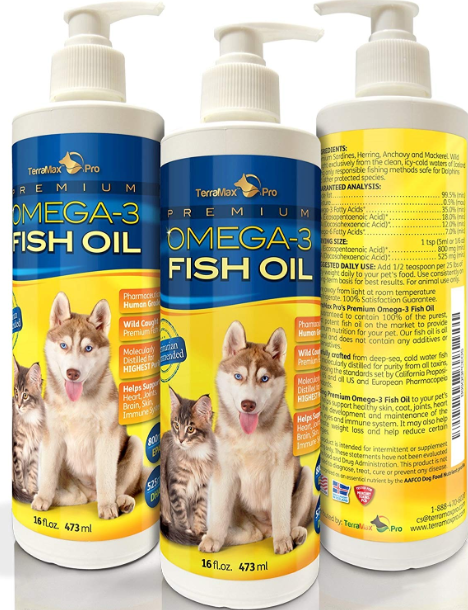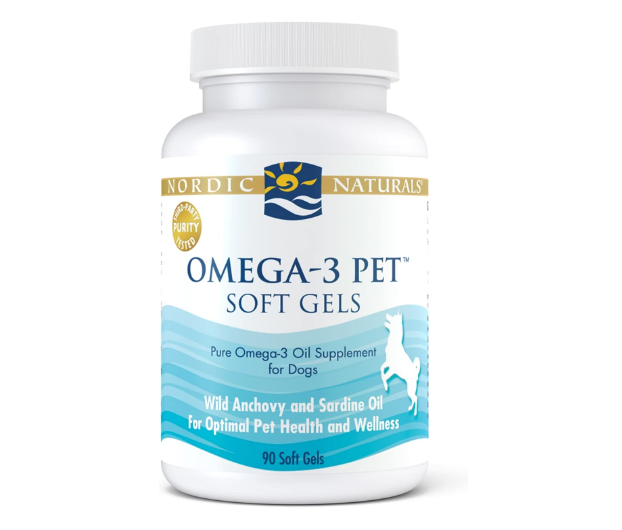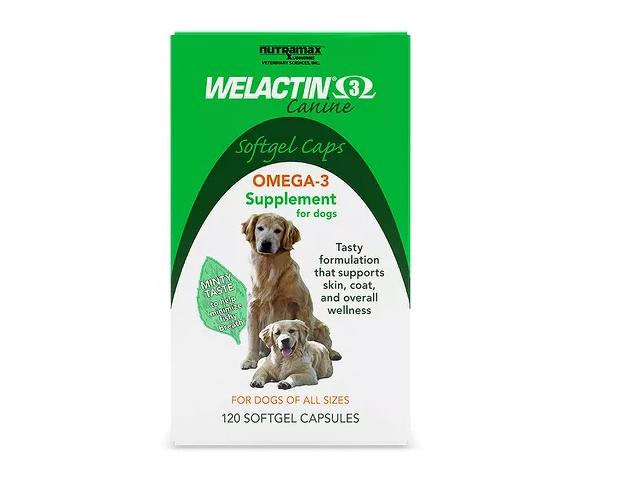As a dog owner, I’m always on the hunt for ways to enhance the well-being of my furry companions. Over the years, one supplement consistently stands out in discussions is fish oil for dogs.
Diving into its sea of benefits, it’s clear that fish oil is more than just a trend in pet nutrition. From promoting a gleaming coat to safeguarding their tender joints, the advantages of this golden elixir are vast.
But with so many products on the market, how do you ensure you’re making the best choice for your beloved pet?
In this article, we’ll embark on a journey to unravel the mysteries of fish oil and guide you through the selection process, ensuring your dog gets the very best.
What Is Fish Oil?
Fish oil is a rich source of omega-3 fatty acids, primarily derived from the tissues of cold-water fatty fish like salmon, mackerel, sardines, and herring. These omega-3 fatty acids, namely eicosapentaenoic acid (EPA) and docosahexaenoic acid (DHA), are essential nutrients lauded for their myriad health benefits.
Unlike many fats, the body cannot produce omega-3s on its own, making dietary intake crucial. Fish oil’s potency in these fatty acids makes it a preferred supplement for both humans and animals.
The benefits of EPA and DHA range from supporting cardiovascular health and reducing inflammation to promoting brain health. Furthermore, the anti-inflammatory properties of fish oil have made it a popular choice for managing conditions like arthritis.
While fish oil supplements are commonly consumed in capsule or liquid form, it’s vital to ensure they are sourced from clean, sustainable sources to avoid contaminants like mercury.
Why Should I Give Fish Oil To My Dog?
Fish oil, rich in omega-3 fatty acids like EPA and DHA, offers myriad health benefits for dogs. Regular supplementation can enhance skin and coat health, reducing itchiness and promoting a glossy shine. Omega-3s also exhibit anti-inflammatory properties, aiding dogs with inflammatory conditions like arthritis.
Further, DHA plays a pivotal role in brain and eye development, making it beneficial for puppies. Additionally, fish oil can support cardiovascular health, lower blood triglycerides, and modulate the immune system.
Given these advantages, fish oil can be a valuable addition to your dog’s diet, ensuring they remain active and healthy throughout their lives.
Benefits of Fish Oil For Dogs

- Skin and Coat Health: Fish oil fortifies a dog’s skin barrier, reducing dryness and itchiness. The omega-3 fatty acids lend a lustrous sheen to the coat, making it look healthier and more vibrant.
- Anti-Inflammatory Properties: Omega-3s, especially EPA and DHA, have natural anti-inflammatory effects. They can alleviate symptoms in dogs with inflammatory diseases, such as arthritis, providing comfort and improved mobility.
- Brain Development: DHA is instrumental in neural development. Puppies supplemented with fish oil often demonstrate better cognitive functions and trainability, benefiting from enhanced brain and nervous system health.
- Cardiovascular Health: Fish oil can support a dog’s heart health. It assists in reducing harmful triglyceride levels and regulating blood pressure, ensuring a robust cardiovascular system.
- Immune Function Support: Omega-3 fatty acids modulate the immune system. This regulation can be beneficial for dogs with autoimmune disorders, striking a balance that prevents overactivity or under activity of immune responses.
- Joint Health: Regular intake of fish oil can reduce inflammation in joints. This not only relieves pain but can also enhance flexibility and overall joint health, especially vital for senior dogs or breeds prone to joint issues.
- Eye Development: DHA, found abundantly in fish oil, is pivotal for eye development. It’s especially crucial for puppies, ensuring proper eye health and potentially reducing the risk of vision-related issues later in life.
Related: Can Dogs Eat Rosehip Oil? Can You Use Rosehip Oil For Dogs Skin? Full Guide!
How To Choose Fish Oil for My Dog?
Choosing high-quality fish oil for your dog is essential to ensure they reap the maximum benefits while avoiding potential contaminants. Here’s a guide to help you make an informed decision:
- Source of the Fish: Opt for fish oil sourced from wild-caught fish over farmed fish. Wild fish, especially those from cold waters like salmon, sardines, and mackerel, tend to have higher omega-3 content and are less likely to be exposed to contaminants and antibiotics.
- Purity & Contaminants: Ensure the fish oil has been molecularly distilled. This process removes harmful heavy metals, PCBs, and other toxins. Some brands will provide a certificate of analysis confirming the purity.
- Omega-3 Content: The fish oil should clearly list the amounts of EPA and DHA. These are the primary omega-3 fatty acids that provide the bulk of the benefits.
- Form of Supplement: Fish oil for dogs is available in various forms, including liquid, soft gels, and chews. Choose the form that’s most convenient for you and acceptable to your dog. Liquids can be easily mixed into food, while some dogs might take capsules or chews as treats.
- Additional Ingredients: Some fish oils come fortified with other beneficial ingredients like Vitamin E, which acts as an antioxidant and can prolong the shelf-life of the oil. However, ensure there are no unnecessary fillers or additives.
- Reviews and Recommendations: Check reviews from other dog owners. They can provide firsthand experience about the oil’s palatability and effects. Also, consider asking your veterinarian for brand recommendations.
- Price vs. Quality: While it might be tempting to go for cheaper options, it’s essential to prioritize quality. Higher-priced fish oils often offer better purity and concentration, leading to better health outcomes for your dog.
When introducing fish oil to your dog’s diet, start with a smaller dose to monitor for any adverse reactions, and consult your veterinarian to ensure you’re giving the right amount based on your dog’s size and needs.
TerraMax Pro Premium Liquid Omega-3 Fish Oil

TerraMax Pro’s Premium Omega 3 Fish Oil is the best fish oil available worldwide. It’s purified for maximum efficacy without the unpleasant fish smell after being carefully created from deep-sea, cold-water fish and molecularly distilled for purity from all contaminants.
TerraMax Pro’s Premium Omega-3 Fish Oil is guaranteed to contain 100% of the cleanest, most powerful fish oil on the market, ensuring your pet receives the best nutrition possible. This fish oil is completely natural and contains no additives or preservatives.
Omega-3 Pet Soft Gel Capsules by Nordic Naturals

Dogs and cats, young and old, require omega-3 fatty acids just like humans, but they can only obtain these essential nutrients through their food. A high-quality, pure omega-3 fish oil made specifically for dogs and cats is a safe and dependable solution to help improve overall pet well-being.
Dogs and cats can benefit from fresh omega-3 fish oil. Promotes heart, skin, and coat health, as well as joint and immune system health. Daily assistance with brain and eye growth and upkeep Omega-3 supplementation that is both safe and beneficial for canine and feline companions. All dogs and cats can use liquid, and medium- to large-breed dogs can use soft gels.
Nutramax Welactin Omega-3 Fish Oil

Welactin is high in omega-3 fatty acids, which are sourced from wild-caught cold-water fish. Welactin is designed to provide dogs with high quantities of EPA (eicosapentaenoic acid) and DHA (docosahexaenoic acid).
Healthy fatty acids have been identified as DHA and EPA. Nutramax Laboratories Veterinary Sciences, the #1 veterinarian-approved supplement company, brings you Welactin Omega-3 Supplements.
How Much is the Right Amount of Fish Oil for Dogs?
Determining the correct dosage of fish oil for your dog is vital to ensure they receive its benefits without any potential adverse effects. When considering the right amount, it’s essential to look at the omega-3 content, particularly the EPA (eicosapentaenoic acid) and DHA (docosahexaenoic acid) concentrations. Here’s a general guideline:
1. General Dosage Guideline: A widely accepted general recommendation for fish oil dosage in dogs is to provide about 20-55mg combined EPA and DHA per pound of body weight daily. However, this range can vary based on specific health needs.
2. Health Condition Specifics:
- For maintaining general health: 20mg of combined EPA and DHA per pound of body weight.
- For therapeutic purposes (e.g., to address skin conditions, inflammation, kidney disease, or arthritis): Up to 40-55mg combined EPA and DHA per pound of body weight.
3. Read the Label: It’s essential to read the fish oil supplement label. Not all the oil in a fish oil supplement is EPA and DHA. The label should provide details about the amount of EPA and DHA in each serving.
4. Start Slowly: When introducing fish oil to your dog’s diet, start with a smaller dose and gradually increase it to the recommended amount over a week. This gradual introduction can help prevent digestive upset.
5. Consider the Entire Diet: If your dog’s regular diet includes foods enriched with omega-3s, you may need to adjust the fish oil dosage accordingly.
6. Form of Fish Oil: Whether you choose liquid, capsule, or chewable forms can affect the dosage. Liquid forms can be more easily adjusted to get the exact dosage, while capsules or chews may have set amounts of omega-3s.
7. Regular Monitoring: Regularly monitor your dog for any signs of adverse reactions, like diarrhea, and adjust the dosage as needed.
8. Veterinary Guidance: It’s crucial to consult with a veterinarian before starting fish oil supplementation. They can provide specific guidance tailored to your dog’s needs, considering factors like age, health condition, weight, and dietary intake.
Related: Can You Use Jojoba Oil For Dogs? Is It Safe? [Full Guide]
Potential Negative Effects of Fish Oil Use on Dogs
Fish oil is generally considered safe for dogs when given in appropriate doses. However, as with any supplement, there’s the potential for adverse side effects, especially if administered in excessive amounts. Here are some potential adverse effects of using fish oil for dogs:
- Digestive Upset: One of the most common side effects is gastrointestinal discomfort. Some dogs might experience diarrhea, vomiting, or indigestion, especially when introduced to fish oil too rapidly or given in large amounts.
- Increased Bleeding: Omega-3 fatty acids can have an anticoagulant effect, potentially leading to increased bleeding. This is especially significant if your dog is already on medications that affect blood clotting or is about to undergo surgery.
- Allergic Reactions: Although rare, some dogs might be allergic to components in fish oil, leading to symptoms like itching, swelling, or difficulty breathing.
- Vitamin E Deficiency: Fish oil can increase the metabolic rate of vitamin E. Over time and with high doses of fish oil, this could lead to a vitamin E deficiency if not supplemented.
- Drug Interactions: Fish oil might interact with certain medications, such as anticoagulants or blood pressure drugs, which could enhance or reduce the effect of these medications.
- Altered Immune Response: While omega-3s can help modulate the immune system, excessive intake might suppress it too much, potentially increasing susceptibility to infections.
Questions To Ask Your Vet
When considering introducing fish oil or any other supplement or change to your pet’s regimen, it’s essential to have a thorough discussion with your veterinarian. Here are some pertinent questions you might consider asking:
- Is fish oil appropriate for my dog’s specific health condition or life stage?
- What is the recommended dosage of fish oil for my dog’s weight and age?
- Are there any potential interactions between fish oil and medications or other supplements my dog is currently taking?
- What are the potential side effects or signs of an adverse reaction I should watch out for?
- How long should I expect to see the benefits of giving fish oil to my dog?
- Should I consider alternating fish oil with other sources of omega-3s, like flaxseed oil or krill oil?
- How often should I give fish oil to my dog? Daily or on alternate days?
- If my dog has a fish allergy, is fish oil still safe?
- Can fish oil replace any of the current medications or supplements my dog is taking?
- Is there a risk of overdose? What are the signs and what should I do if I suspect an overdose?
Remember, your veterinarian is your primary source of professional advice regarding your pet’s health. Always consult with them before making decisions about your dog’s dietary or medicinal regimen.
Conclusion
Incorporating fish oil into your dog’s diet can offer a plethora of health benefits, from enhancing skin and coat conditions to supporting cognitive and joint health. However, like any supplement, it’s essential to administer it judiciously, considering quality, dosage, and your pet’s unique needs. Regular monitoring and consultation with your veterinarian can ensure that your dog reaps the advantages of fish oil while minimizing potential side effects. With the right approach, fish oil can be a valuable addition to your dog’s holistic health regimen.
Learn if castor oil, peanut oil or jojoba oil are safe for dogs as well and how to store rosehip oil properly here. You can also find all our rosehip oil guides here.



Comments are closed.